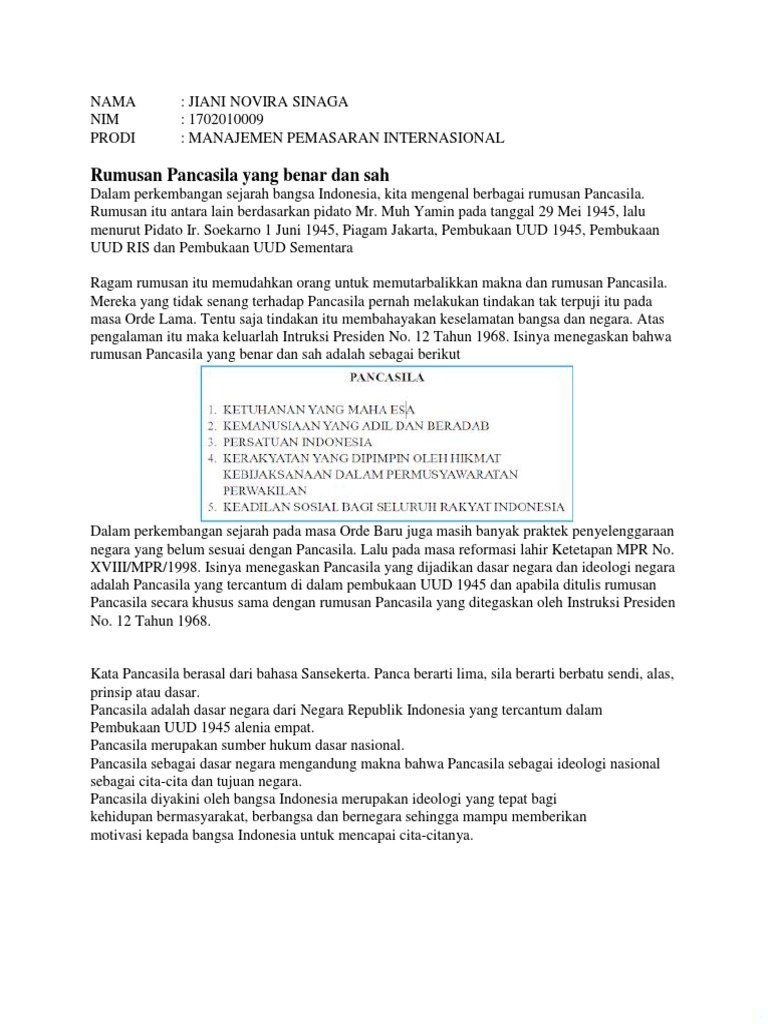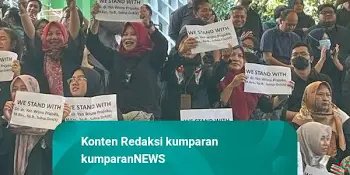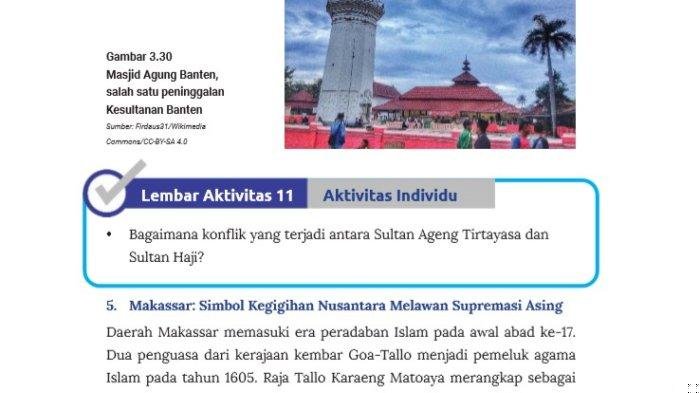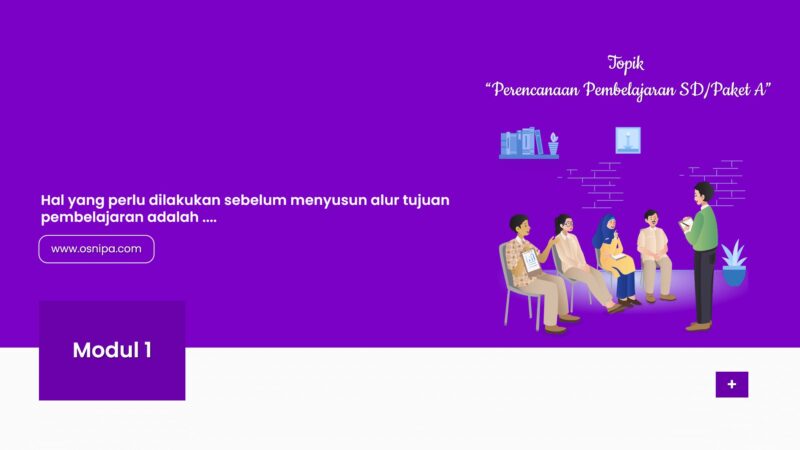Rumusan Dasar Negara Pancasila Yang Resmi Dan Sah Terdapat Dalam Konteks Sejarah

The official and legitimate formulation of the Pancasila state ideology finds its foundation in the preamble of Indonesia’s 1945 Constitution. This framework embodies the nation’s beliefs and serves as a guiding principle for governance and society. Understanding this official formulation is essential for grasping the values that unite the Indonesian people.
As we delve into the essence of Pancasila, it becomes clear that its principles address the aspirations of the nation while promoting harmony and justice. Let’s explore how these foundational ideas resonate within Indonesia’s identity and political landscape.
Rumusan Dasar Negara Pancasila yang Resmi dan Sah Terdapat Dalam
Pancasila stands as the foundational philosophy and ideology of Indonesia, encapsulating the principles that guide the nation. The official formulation of Pancasila, which reflects the consensus of the Indonesian people, is essential in understanding the nation’s identity, values, and vision. In this article, we’ll discuss the official and valid formulation of Pancasila, its historical context, principles, relevance, and its position in Indonesian law.
Historical Context of Pancasila
Understanding the formulation of Pancasila necessitates a look back at Indonesia’s history, particularly during the early 20th century.
- Colonial Era: The struggle against Dutch colonialism fostered a sense of nationalism among Indonesians, leading to the desire for independence and self-determination.
- Independence Movement: Prominent figures in the independence movement, such as Sukarno and Mohammad Hatta, laid the groundwork for a national ideology that would unite the diverse archipelago.
- Birth of Pancasila: On June 1, 1945, Sukarno proposed Pancasila during a speech to the Indonesian National Assembly. This proposal was refined and formalized in subsequent discussions.
These historical events paved the way for Pancasila to become the guiding philosophy of the nation post-independence.
Official Formulation of Pancasila
The official formulation of Pancasila consists of five principles that serve as the foundation of the Indonesian state. These principles are:
- Belief in the One and Only God: This principle emphasizes the importance of spirituality and faith in God, reflecting Indonesia’s diverse religious landscape.
- Just and Civilized Humanity: This principle highlights the need for respect and dignity among all human beings, advocating for human rights and equality.
- Indonesian Unity: Fostering a sense of unity among the diverse ethnicities, cultures, and religions found across Indonesia is crucial for national integrity.
- Democracy Guided by the Inner Wisdom of Deliberations Among Representatives: This principle underscores the importance of participatory democracy and collective decision-making.
- Social Justice for All Indonesians: This principle emphasizes the fair distribution of resources and opportunities to ensure equitable welfare for all citizens.
These five principles encapsulate the philosophy that guides the Indonesian state, reflecting its aspirations and values.
Pancasila in the Indonesian Constitution
Pancasila is not merely an ideology; it is enshrined within the Indonesian Constitution. The precise legal status of Pancasila is crucial for its implementation and relevance.
Preamble of the 1945 Constitution
The Preamble of the 1945 Constitution states that Pancasila is the foundation of the state. It’s a commitment to uphold the principles outlined within it. The constitutional framework ensures that Pancasila remains the cornerstone of Indonesian governance, shaping policies and laws.
Legal Protections and Enforcement
Various laws in Indonesia reinforce the principles of Pancasila, ensuring that they are respected and implemented. Key points include:
- The law guarantees the freedom of religion, which aligns with the first principle of Pancasila.
- Human rights laws reflect the second principle, asserting the rights and dignity of all individuals.
- Regulations that support unity and diversity can be traced back to the third principle.
This legal framework helps maintain the integrity of Pancasila as Indonesia progresses through various social and political challenges.
The Relevance of Pancasila Today
Pancasila remains a crucial part of Indonesian society. Its relevance can be observed in various aspects:
Social Cohesion
In a nation known for its diversity, Pancasila serves as a unifying force. It promotes mutual respect among different cultures and religions. This principle is particularly relevant in fostering peace and harmony in a multi-ethnic society.
Political Landscape
Pancasila guides political discourse in Indonesia. It reminds political leaders and citizens alike about the importance of democracy, justice, and unity. Political parties often refer to Pancasila in their platforms and campaigns, emphasizing its ongoing significance.
Education and Youth Development
Pancasila is integrated into the educational curriculum, ensuring that young Indonesians understand and appreciate their national identity. Schools teach these principles to help cultivate a sense of pride and responsibility among the youth.
Challenges to Pancasila
Despite its importance, Pancasila faces challenges in contemporary Indonesia.
Radicalism and Extremism
Radical ideologies that contradict the principles of Pancasila pose a significant threat. These ideologies can lead to intolerance and conflict, undermining the social cohesion that Pancasila seeks to promote.
Political Misinterpretation
Sometimes, politicians may manipulate Pancasila to serve their interests, steering it away from its original intent. This misinterpretation can lead to polarization and division, which Pancasila strives to prevent.
The Future of Pancasila
Looking ahead, Pancasila will continue to evolve. Its principles might adapt to meet new challenges while staying true to its foundational ideals.
Globalization
As Indonesia engages more with the global community, Pancasila can serve as a model for unity amid diversity. Emphasizing the importance of cultural integrity and social justice aligns with global values, offering a unique perspective in international discussions.
Technological Advances
The rise of digital communication presents opportunities and risks. Pancasila can guide ethical digital engagement, promoting respect and understanding while discouraging hate speech and division online.
Pancasila plays a fundamental role in shaping Indonesia’s identity. Its official formulation embodies the aspirations of the Indonesian people, guiding laws, policies, and societal values. Understanding Pancasila’s roots, its application in the Constitution, and its relevance in today’s world reveals its significance in fostering a just, unified, and democratic society. Moving forward, Pancasila will remain a beacon, guiding Indonesia through challenges and opportunities while celebrating its rich diversity and unity.
3 Tokoh Nasional Perumus Pancasila dan Isi Rumusan Dasar Negara
Frequently Asked Questions
“`html
What are the key principles of Pancasila that embody the Indonesian nation?
Pancasila consists of five principles that serve as the foundation of the Indonesian state. These principles are:
1. Belief in One God
2. Just and civilized humanity
3. The unity of Indonesia
4. Democracy guided by the wisdom of representative deliberation
5. Social justice for all Indonesian people.
These principles reflect the values and aspirations of the Indonesian people and guide the nation’s policies and governance.
How does Pancasila influence the Indonesian constitution?
Pancasila forms the philosophical and ideological basis of the Indonesian Constitution. It is embedded in the preamble of the Constitution, known as the 1945 Constitution (UUD 1945). This integration ensures that all laws and governmental actions align with the principles of Pancasila, promoting national unity and upholding justice.
In what document can the official formulation of Pancasila be found?
The official formulation of Pancasila can be found in the Presidential Decree No. 24 of 1972, which consolidates its role as the state ideology. This decree establishes Pancasila as the guiding principle for the government and education, ensuring that it remains central to Indonesian identity and governance.
What role does Pancasila play in Indonesian education?
Pancasila serves as a fundamental component of the Indonesian education system. Schools incorporate its principles into the curriculum to instill national values, promote unity, and encourage civic responsibility among students. This education aims to nurture a sense of belonging and commitment to the nation’s ideals.
How is Pancasila relevant in contemporary Indonesian society?
Pancasila remains highly relevant in contemporary Indonesian society as it provides a framework for addressing social issues, fostering tolerance, and promoting national identity. It guides discussions on democracy, human rights, and social welfare, helping to maintain harmony and consensus in a diverse population.
“`
Final Thoughts
Rumusan dasar negara Pancasila yang resmi dan sah terdapat dalam Pembukaan UUD 1945. This foundational ideology serves as a guiding principle for the Indonesian state and reflects the values of the nation. Pancasila emphasizes unity, justice, and democracy, shaping the identity and governance of Indonesia. Understanding this framework is crucial for appreciating Indonesia’s political culture and development.







